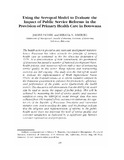Using the servqual model to evaluate the impact of the public service reforms in the provision of primary health care in Botswana

View/
Date
2010-09Author
Pansiri, J.
Mmereki, R.N.
Publisher
Routledge, www.routledge.comType
Published ArticleMetadata
Show full item recordAbstract
The health sector is pivotal to any national development initiative; hence, Botswana has taken seriously the principle of primary
health care as contained in the the Alma-Ata declaration of
1978. As a demonstration of their commitment, the government
of Botswana has passed a number of National Development Plans,
health policies, and numerous reforms with a view of enhancing
service quality in this sector. Many reforms and restructuring
exercises are still ongoing. This study uses the SERVQUAL model to evaluate the implementation of Work Improvement Teams (WITs) in the hospitals=clinics as a reform initiative adopted by the Botswana government to enhance the productivity, efficiency, and performance of the public sector (particularly the health sector). This discussion will demonstrate that the SERVQUAL model can be used to review the impact of public policy. This will be
achieved by measuring the level of service quality and customer
satisfaction using the SERVQUAL model through data that were collected from 151 hospital=clinic customers in Gaborone, the capital city of the Republic of Botswana. Descriptive and inferential
statistics were used to analyze the data, and the findings indicate
that the adoption and implementation of reforms in the public health sector have not improved the level of service quality and customer satisfaction as indicated by a significant gap between customer expectations and perceptions.
